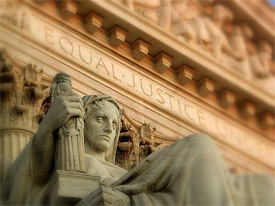With a Much-Anticipated Fusion GPS Witness, Andrew DeFilippis Bangs the Table
Thanks to those who’ve donated to help defray the costs of trial transcripts. Your generosity has funded the expected costs. If you appreciate the kind of coverage no one else is offering, we’re still happy to accept donations for this coverage — which reflects the culmination of eight months work.
Andrew DeFilippis has done several arguably unethical things in an attempt to win the Michael Sussmann trial.
He repeatedly attempted to get Marc Elias to repeat something Elias shouldn’t have said in the first place: that the only way to understand whether Sussmann had gone to the FBI to benefit the Hillary campaign would be to ask him (in response to which stunt Sussmann is asking for a mistrial).
DeFilippis also set up a ploy to get a non-expert to offer opinions that only an expert should offer (more on that later).
At times (such as during Neustar employee Steve DeJong’s testimony), DeFilippis seemed more focused on eliciting testimony that might help him make a case against Rodney Joffe than obtain a guilty verdict against Sussmann.
And in direct examination yesterday of Fusion’s Laura Seago (my reading of the transcript is here), he did both, violating Judge Cooper’s orders in an attempt to set up his ongoing investigation in a way that did nothing to help him win the trial against Sussmann.
For all the anticipation for it, Seago’s testimony was not all that helpful to Durham’s team. She described having about as much awareness of which Democratic entity Fusion’s ultimately client was as the FBI did on Carter Page’s FISA applications. She indicated that the Alfa Bank allegations were just one of a whole bunch of possible ties to Russia that Trump had. She described how, to the extent Fusion could assess the Alfa Bank allegations, they found them credible. In discussing Fusion’s pitch to Franklin Foer on the Alfa Bank story, she described the other major data scientists who had backed the Alfa Bank allegations, identities that Durham has always suppressed because they kill his conspiracy theory.
Q. And what was discussed? What did you say, and what did they say?
A. I really don’t remember the specifics six years on. We talked about the allegations between the Trump organization and Alfa-Bank. We talked about highly credible computer scientists who seemed to think that these allegations were credible.
Q. And by that, are you referring to Mr. Joffe or somebody else?
A. There were others that ended up being cited in Mr. Foer’s article. He cited L. Jean Camp and Paul Vixie, who invented the DNS system.
During cross-examination by Sussmann lawyer Sean Berkowitz, Seago made it clear she didn’t tell Foer about the FBI investigation into these matters.
Q. And with respect to your meeting with Mr. Foer, did you tell Mr. Foer that the FBI was investigating these allegations?
A. No. I had no knowledge of that investigation.
Q. So before your meeting with Franklin Foer, did you have any information that the FBI was involved in any way?
A. No.
Q. All right. Did Mr. Fritsch or anyone else at the meeting say, “The FBI is looking into this”?
A. Not that I can remember.
Also on cross, Seago described that her impression from having dealt with Joffe is that he really did believe the allegations too.
Q. And your impression of Mr. Joffe that was made at that meeting was that he was — he seemed reliable?
A. Yes.
Q. And he seemed well-placed to have knowledge and information about the server issues?
A. Yes, he did.
Q. And you understood that Mr. Joffe supported the suggestion that there was at least potential contact between Trump servers and Alfa-Bank servers?
A. Yes, I did.
MR. DeFILIPPIS: Objection, Your Honor.
THE COURT: Overruled.
Q. You answered the question?
A. Yes, I did understand that.
But it was in DeFilippis’ treatment of emails that Judge Cooper granted Durham’s team access to, but did not permit them to use at trial, where he got particularly obnoxious. Remember: while Durham’s team maintained from the start that the privilege claims behind these emails were not proper (because they were largely about communicating with the press, not about providing research assistance to the Democrats), the reason they didn’t get access to them was their own incompetence. They didn’t ask for a privilege review until right before trial.
DeFilippis has no one to blame but himself, but in true right wing fashion, he’s lashing out.
Perhaps in an attempt to make some drama out of documents that Cooper described “not very revelatory,” DeFilippis walked Seago through all the ones she was privy to, including those with Joffe that Cooper ruled were privileged.
Generally, such exchanges went something like this:
Q. Ms. Seago, does this appear to be part of the same chain as the prior email exchanges?
A. It has the same “Subject” line and says “Re,” so that is what it appears to be. I have no independent recollection of this email.
Q. And what, if any, connection in your mind did the Alfa Bank issue have to New York? I ask because “New York” is in the “Subject” line. Any sense?
A. I don’t know.
Q. And the attachment on this email, any sense of what that was?
A. I don’t know.
Note: there’s no reason to believe Seago has reviewed these emails recently.
That was all setup for DeFilippis’ last set of questions:
Q. Did you ever receive instructions that you couldn’t disclose your affiliation with Fusion GPS to the media?
A. No. I don’t remember hiding that affiliation from the media ever.
Q. Do you ever remember hiding or considering hiding that affiliation from anyone?
A. No.
Q. How certain are you of that?
A. I’m quite certain. You know, we don’t go around advertising who we are and where we work, but I certainly don’t lie to people, and I don’t lie to the press about where I work.
Q. Okay. So you’re fairly certain you never sought to conceal that?
A. Not that I can recall.
Immediately after Seago left the stand, DeFilippis asked for a bench conference (the DC Court adopted phones for the purpose during COVID and all the judges love them, so they’re keeping them). Seago’s answer to the question, DeFilippis noted, was inconsistent with the content of the email, which referenced Tea Leaves.
MR. DeFILIPPIS: Your Honor, could we speak to you on the phone?
THE COURT: Excuse me?
MR. DeFILIPPIS: Could we speak to you on the phone?
THE COURT: Yes. (The following is a bench conference outside the hearing of the jury)
MR. DeFILIPPIS: Your Honor, can you hear me now?
THE COURT: Yes.
MR. DeFILIPPIS: So we have an issue with regard to Ms. Seago’s testimony. The government followed carefully Your Honor’s order with regard to the Fusion emails that were determined not to be privileged but that the government had moved on.
As Your Honor may recall, there was an email in there in which Ms. Seago talks very explicitly about seeking to approach someone associated with the Alfa-Bank matter and concealing her affiliation with Fusion in the email. When we asked her broadly whether she ever did that, she definitively said no when I, you know, revisited it with her. So it raises the prospect that she may be giving false testimony.
And so we were — you know, I considered trying to refresh her with that, but I didn’t understand that to be in line with Your Honor’s ruling. So the government is — we’d like to consider whether we should be — we’d like Your Honor to consider whether we should be able to at least recall her and refresh her with that document?
THE COURT: I don’t remember that question, but the subject matter was concealing Fusion or her identities in conversations with the press. If I recall correctly, that email related to “tea leaves,” correct?
MR. DeFILIPPIS: Your Honor, I thought I had phrased it more broadly. We can go to the transcript.
THE COURT: Mr. Berkowitz?
MR. BERKOWITZ: Judge, I’m not familiar with the specifics. I’m happy to take a look at the transcript. I certainly got the impression he was asking if she had ever concealed Fusion as an entity from the press. That was what was asked in her deposition, and she answered the same way in her deposition. One thing, just to note, some of our paralegals can hear Mr. DeFilippis talking, so I suggest, just as a reminder, to keep your voices down.
MR. DeFILIPPIS: Sure, sure.
THE COURT: All right. Let me look at the transcript.
(Pause)
THE COURT: Can you hear me?
MR. DeFILIPPIS: Yes, Your Honor.
THE COURT: All right. Looking at the transcript, I think you did ask a more open-ended question. She said, “I don’t remember hiding that affiliation from the media ever.” And then you followed up, “Do you ever remember hiding or considering hiding that affiliation from anyone?” And she answered, “No.” I would — so I think that she — I think the email is inconsistent with her answer, Mr. Berkowitz. But the question now is whether they can refresh her with that email notwithstanding the Court’s order. And now she’s gone.
How are we going to do that even if we were to allow it? Is it worth the candle of calling her back?
MR. DeFILIPPIS: Your Honor, I understand she’s still in the building.
MR. BERKOWITZ: Your Honor, is this email privileged?
MR. DeFILIPPIS: This was one of the emails that was determined not to be privileged by Your Honor.
MR. BERKOWITZ: So why didn’t they impeach her with it when they had the chance?
MR. DeFILIPPIS: Your Honor, the reason is because I didn’t want to violate Your Honor’s order that we couldn’t use those affirmatively.
THE COURT: Well, I think the time to have asked the Court whether using the document to refresh was consistent with the order was before she was tendered and dismissed. So I think you waived your opportunity. All right? So we’re going to move on.
Frankly, I think using the formerly privileged emails to impeach was beyond the scope of Cooper’s order, too. This was an affirmative use of the email!
But this was nothing more than a perjury trap, and with it an attempt to get the content of the email DeFilippis had been prohibited from using before the jury. Cooper didn’t allow it in, though he shouldn’t have allowed that line of questions in either (had such questions been permitted, then Seago should have been permitted to refresh her own memory of them).
Probably, DeFilippis will consider charging her with perjury over this. I think the fact that both Judge Cooper and Berkowitz had the impression that the question pertained solely to outreach to the press, Seago’s reiteration that, “I don’t lie to the press about where I work,” reinforcing that understanding, plus her last minute caveat, “Not that I can recall,” would make such a case as flimsy as this one. Probably, DeFilippis will use this exchange as part of his bid to get access to some subset of the 1,500 other not very revelatory emails that Democrats have claimed privilege over.
But this was a stunt. It wasn’t about getting, or sharing, the truth with the jury (and any scenario in which I can imagine Seago trying to hide her identity with Tea Leaves would suggest a more distant relationship than even I imagined Fusion had, though I would love to know what it was).
When a prosecutor engages in as many stunts as DeFilippis has, it’s a confession he knows the facts are not on his side.





